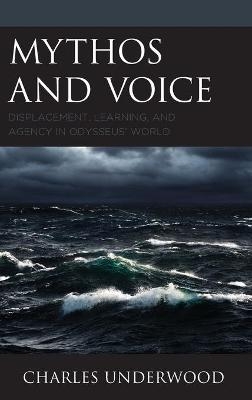
Mythos and Voice
Displacement, Learning, and Agency in Odysseus' World
Seiten
2018
Lexington Books (Verlag)
978-1-4985-3424-6 (ISBN)
Lexington Books (Verlag)
978-1-4985-3424-6 (ISBN)
Charles Underwood focuses on mythos and voice in the Odyssey to illuminate the characters’ journeys from social displacement through discovery and recovery. He explores how the epic narrative illustrates an ancient tradition’s understanding of how one learns to make one’s way as an active agent in an uncertain world.
This book focuses on mythos and voice in the Odyssey, to illuminate its characters’ journeys from social displacement through discovery and recovery. Mythos and Voice approaches the Odyssey as a narrative of displacement – a narrative that maps the social displacement of its characters, explores the cognitive consequences of that displacement, and embodies the variable strategies by which those characters learn to resolve their displacement. It is a narrative that also employs and elaborates the characters’ own narratives of displacement as genres enabling them to resist externally imposed definitions of their situations and to redefine and ultimately reclaim their own place in the world, not as it was before their displacement, but as it must be, given the new post-heroic world in which they now live.
The focus on mythos and voice enables readers to approach the study of learning and the acquisition of personal agency in the context of a hazardous world – the cultural world that Odysseus navigates in Homer’s epic poem. With this focus, the author examines interactive processes of human learning in a specific cultural context – the epic universe of Homeric narrative. By ethnographically examining the learning contexts portrayed in Homer’s epic, Mythos and Voice elucidates an Archaic Greek view of human learning through examples that show how the author(s) of the Odyssey envisioned and dramatized displacement, learning and agency in the epic work. The book focuses on aspects of Homeric cognition as they cumulatively develop among key characters within the Odyssey’s inventive narrative structure. In this way, Mythos and Voice describes a culturally specific “theory” of learning and development – a perspective that proved compelling in the pre-classical and classical Greek world, even as it does to readers now.
This book focuses on mythos and voice in the Odyssey, to illuminate its characters’ journeys from social displacement through discovery and recovery. Mythos and Voice approaches the Odyssey as a narrative of displacement – a narrative that maps the social displacement of its characters, explores the cognitive consequences of that displacement, and embodies the variable strategies by which those characters learn to resolve their displacement. It is a narrative that also employs and elaborates the characters’ own narratives of displacement as genres enabling them to resist externally imposed definitions of their situations and to redefine and ultimately reclaim their own place in the world, not as it was before their displacement, but as it must be, given the new post-heroic world in which they now live.
The focus on mythos and voice enables readers to approach the study of learning and the acquisition of personal agency in the context of a hazardous world – the cultural world that Odysseus navigates in Homer’s epic poem. With this focus, the author examines interactive processes of human learning in a specific cultural context – the epic universe of Homeric narrative. By ethnographically examining the learning contexts portrayed in Homer’s epic, Mythos and Voice elucidates an Archaic Greek view of human learning through examples that show how the author(s) of the Odyssey envisioned and dramatized displacement, learning and agency in the epic work. The book focuses on aspects of Homeric cognition as they cumulatively develop among key characters within the Odyssey’s inventive narrative structure. In this way, Mythos and Voice describes a culturally specific “theory” of learning and development – a perspective that proved compelling in the pre-classical and classical Greek world, even as it does to readers now.
Charles Underwood is executive director of University-Community Links in the Graduate School of Education at the University of California, Berkeley.
Chapter 1: Journey of the Heart: Navigating a World of Trouble
Chapter 2: Telemakhos in the Zone: Learning with Others in Mind
Chapter 3: Engendering the Male: Mentor and Mythos in Telemakhos’ Journey
Chapter 4: Penelope’s Wonder: Navigating the Mythos of Masculinity
Chapter 5: Odysseus on Edge: Learning to Survive in an Unreal World
Chapter 6: Iron Will and Heart’s Desire: Body and Voice in the Heart’s Journey
| Erscheinungsdatum | 10.05.2021 |
|---|---|
| Verlagsort | Lanham, MD |
| Sprache | englisch |
| Maße | 159 x 231 mm |
| Gewicht | 517 g |
| Themenwelt | Geisteswissenschaften ► Sprach- / Literaturwissenschaft ► Anglistik / Amerikanistik |
| Geisteswissenschaften ► Sprach- / Literaturwissenschaft ► Latein / Altgriechisch | |
| Geisteswissenschaften ► Sprach- / Literaturwissenschaft ► Literaturwissenschaft | |
| Sozialwissenschaften ► Ethnologie | |
| Sozialwissenschaften ► Soziologie | |
| ISBN-10 | 1-4985-3424-4 / 1498534244 |
| ISBN-13 | 978-1-4985-3424-6 / 9781498534246 |
| Zustand | Neuware |
| Haben Sie eine Frage zum Produkt? |
Mehr entdecken
aus dem Bereich
aus dem Bereich
Poetik eines sozialen Urteils
Buch | Hardcover (2023)
De Gruyter (Verlag)
59,95 €
Entzauberung und Faszination des Immergleichen in Literatur und Film
Buch | Softcover (2024)
Springer Fachmedien Wiesbaden GmbH (Verlag)
84,99 €
Buch | Softcover (2024)
belleville (Verlag)
20,00 €


